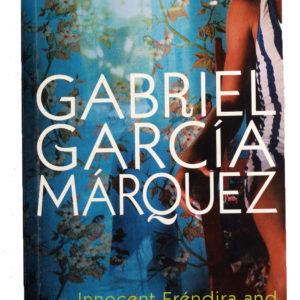Innocent Erendira and Other Stories | Gabriel García Márquez
₨ 478.40
This collection of fiction, representing some of García Márquez’s earlier work, includes eleven short stories and a novella, Innocent Eréndira, in which a young girl who dreams of freedom cannot escape the reach of her vicious and avaricious grandmother.
- Categories: Books, Fiction
- Tags: Gabriel García Márquez, Innocent Erendira and Other Stories, Leftshop, leftshopnepal, radical books, rare readings, red books
“The stories are rich and startling in their matter and confident in their manner….They are–the word cannot be avoided–magical.”–John Updike, The New Yorker
This collection of fiction, representing some of García Márquez’s earlier work, includes eleven short stories and a novella, Innocent Eréndira, in which a young girl who dreams of freedom cannot escape the reach of her vicious and avaricious grandmother.
“García Márquez’s fictional universe has the same staggeringly gratifying density and texture as Proust’s Faubourg Saint-Germain and Joyce’s Dublin….Arguably the best of the Latin Americans.”–Martin Kaplan, The New Republic
“It is the genius of the mature García Márquez that fatalism and possibility somehow coexist, that dreams redeem, that there is laughter even in death.’–John Leonard, New York Times
Related products
Translated from the Hindi by Madhu Singh With a foreword by Angela Y. Davis
September 1970. Ramchandra Singh enters the Hardoi District Jail in Uttar Pradesh as a naxalite undertrial. Barely twenty, his life of expanding prospects—in studies, politics and love—is reduced to the horizon of a life term. The odds are stacked against the survival of his humanity and imagination, but Singh regenerates his gifts of empathy, humour, reflection and, above all, language—in a secret diary smuggled out with the help of friends.
A singular record of recent history and of individual witness, Singh’s prison diary, newly expanded, appears in English for the first time. Offering unprecedented intimacy with the everyday life of the imprisoned everyman, Singh challenges us to look without flinching and question our assumptions about crime and punishment.
Ramchandra Singh (1949–2018), of Bangarmau village in Unnao district of Uttar Pradesh, was a member of the Communist Party of India (Marxist–Leninist) Red Star, and served on its Central Committee. He was part of the editorial board of Red Star Monthly (Hindi). He passed away when this book was in press.
Madhu Singh is a professor in the Department of English and Modern European Languages, University of Lucknow. She has previously translated the scholar G.N. Devy’s work, A Nomad Called Thief, into Hindi as Ghumantu Hain Chor Nahin.
Georgy Valentinovich Plekhanov, 1857–1918, a Russian revolutionary and founder of Marxism in Russia and known as the “Father of Russian Marxism.” His best works in the fields of history, philosophy, aesthetics, social and politics, especially the philosophy of historical materialism, were contributions that very valuable for the development of scientific thought and progressive culture.
Publisher: Aakar Books (1869)
Trotsky’s theory of the permanent revolution is one of the most important additions to the arsenal of marxism. It was first developed by Trotsky in 1904, on the eve of the first Russian Revolution. At that time, all the tendencies of the Russian Social Democracy had the perspective of a bourgeois democratic revolution. Trotsky alone in 1905 put forward the idea that the Russian working class could come to power before the workers of Western Europe. The correctness of Trotsky’s theory was brilliantly demonstrated in 1917, when the Bolshevik Party under Lenin and Trotsky led the Russian proletariat to power in the first workers state in the world.
However, after the death of Lenin in 1924, the theory of the permanent revolution was subject to a vitriolic onslaught by the stalinist bureaucracy, which had in effect renounced world revolution in favour of “socialism in one country”. The attack on the theory came to epitomise the struggle against “Trotskyism”. Today, however, with the collapse of Stalinism (and with it “socialism in one country”), Trotsky’s theory of the permanent revolution has become more relevant than ever.
Publisher : Aakar Publications
‘To be sure, When Google Met WikiLeaks is a vital book, an admirably direct and clear-eyed attempt to make sense of the modern-day privacy and freedom of speech debates’—The Sunday Guardian
‘For those interested to know how present-day geopolitics, surveillance, censorship and publishing (if not foreign policy itself) are being shaped by the gods of the internet, this is recommended reading’—The Telegraph
‘In When Google Met Wikileaks, Assange makes a case for the dark net by suggesting that the open web site we all know best has sinister intentions’—The Independent
‘The most important accomplishment of the book may be the connection Assange establishes between the Google Politic and the ambitions set loose in Digital Age’—Prague Post










Reviews
There are no reviews yet.